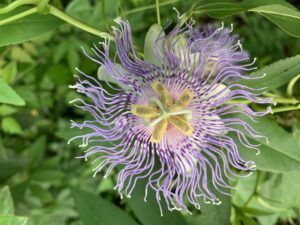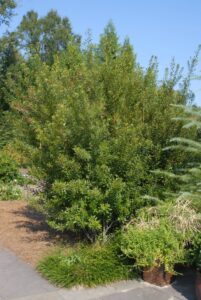Invasives to Avoid This Summer and What to Plant Instead
go.ncsu.edu/readext?1083413
en Español / em Português
El inglés es el idioma de control de esta página. En la medida en que haya algún conflicto entre la traducción al inglés y la traducción, el inglés prevalece.
Al hacer clic en el enlace de traducción se activa un servicio de traducción gratuito para convertir la página al español. Al igual que con cualquier traducción por Internet, la conversión no es sensible al contexto y puede que no traduzca el texto en su significado original. NC State Extension no garantiza la exactitud del texto traducido. Por favor, tenga en cuenta que algunas aplicaciones y/o servicios pueden no funcionar como se espera cuando se traducen.
Português
Inglês é o idioma de controle desta página. Na medida que haja algum conflito entre o texto original em Inglês e a tradução, o Inglês prevalece.
Ao clicar no link de tradução, um serviço gratuito de tradução será ativado para converter a página para o Português. Como em qualquer tradução pela internet, a conversão não é sensivel ao contexto e pode não ocorrer a tradução para o significado orginal. O serviço de Extensão da Carolina do Norte (NC State Extension) não garante a exatidão do texto traduzido. Por favor, observe que algumas funções ou serviços podem não funcionar como esperado após a tradução.
English
English is the controlling language of this page. To the extent there is any conflict between the English text and the translation, English controls.
Clicking on the translation link activates a free translation service to convert the page to Spanish. As with any Internet translation, the conversion is not context-sensitive and may not translate the text to its original meaning. NC State Extension does not guarantee the accuracy of the translated text. Please note that some applications and/or services may not function as expected when translated.
Collapse ▲Did you know warmer temperatures can speed up biological processes, leading to rapid growth in plants and animals alike? This explains why your garden seems to explode with growth during the summer months. However, it’s crucial to distinguish between plants that simply grow quickly and those that actively harm their environment.

Replace the invasive Chinese Wisteria with Passionflower.
The term “invasive” has historically been used to describe fast-growing species or non-native species; however, if something is fast-growing and non-native, it does not necessarily mean it is invasive. To truly be invasive, the species must be harming the native species in that ecosystem. For example, Chinese Wisteria is an epiphytic or climbing invasive species that outcompetes native species by covering its host plant and preventing the host plant’s leaves from receiving sunlight, which is necessary for plant growth.If you have Chinese Wisteria growing in your yard, try replacing it with Maypop, a native passion flower with a tropical appearance. It has the same, if not more enticing, deep purple coloration, an exotic floral display, and provides food for songbirds and mammals.

Wax Myrtle in Full Form By Jim Robbins
If you are in the market for a shrub to add to your landscape, avoid planting Thorny Olive (Elaeagnus pungens) as it is an invasive species that not only aggressively colonizes areas, but forms dense thickets that shade out and outcompete native vegetation. This reduces plant diversity and alters habitat structure. You may think, “I am just planting this in my yard and I will keep it maintained and in control.” However, it is important to remember that these are flowering and fruiting species and the fruits of these plants contain seeds that wildlife will consume and disperse along their travels. Your landscaping choices can significantly impact surrounding natural areas. Rather than a shrub like Thorny Olive, try a Wax Myrtle or Yaupon Holly. Both species can provide a dense border for your lawn and serve as food sources and shelter for birds and other wildlife.
If you have any invasive species in your landscape, consider removing them by cutting them down and digging up their roots. Herbicides, like Glyphosate, are only recommended in extreme cases where it may not be possible to mechanically remove the plant. Especially if applied improperly, herbicides can impact surrounding plants and contaminate soil and groundwater.
Remember, if you are describing a fast-growing plant, try using the words “prolific” or “vigorous” instead, and if a plant isn’t from around here, then it’s just plain “non-native.” Reserve the term invasive for species that truly harm the native species they surround themselves with.
The N.C. Cooperative Extension Center for New Hanover County is located at the Arboretum, 6206 Oleander Drive. The gardens are free and open daily from 8 a.m. to 5 p.m. Reach Gabriella at gadesouz@ncsu.edu or 910-798-7660.




